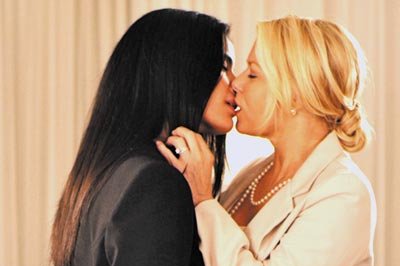Lesbian writer-director Nicole Conn’s “A Perfect Ending” plays QFest 7 p. m. July 21 at the Ritz East, with an encore presentation at 2:15 p.m. July 22. This romantic drama with a twist has an uptight married woman, Rebecca (Barbara Niven), unexpectedly seeking sexual pleasure from Paris (Jessica Clark), an escort, and possibly falling in love. The passionate Conn spoke with PGN about her impassioned new film.
PGN: Rebecca opens herself up to a new experience with Paris. How susceptible do you think people are toward getting out of their comfort zones, as Rebecca says, and discovering themselves? NC: I don’t think they are. This is a twofold story. Women and men do not follow the things they are most fearful of. Barbara Niven was quitting acting the day I gave her the script. She ordered a cheeseburger, which showed that it was true! No actress eats like that. After she read the script, she told me, she had to do this, because it terrified her. It’s about conquering fear and the empowerment you get from it that helps Rebecca redeem her pointless life.
PGN: Why did you make Paris an escort? Do you think the women could have met and had an arrangement under other circumstances? NC: I actually thought as a cinematic device, that’s where the human comedy comes in. Rebecca is a starched, calendar-packed woman doing things, not living life, whereas these women [escorts] were astute and had no inhibitions. For them to hook up plays out in a very funny way. The idea of her having a female escort, rather than best friends, or date, also made it more dangerous.
PGN: Paris is also a painter/pointillist. Why did you see her work as a theme for the film? The opening sequence shows the dots that get connected over the course of the story. NC: I wanted to employ a cinema language that parallels the artwork of pointillism. I did that because I wanted close-ups of things in wide[r] shots that [viewers] didn’t know, but then, later, all the pieces exist. I wanted to look at the detail and the nuance. That is where everything happens. I realize it can be a philosophical approach, but every point counts.
PGN: The music in the film is very distinctive. Who wrote/sang it? NC: The vocals are by Philadelphian Kathy Fowler. To me, her beautiful, haunting vocals are the essence of pain and the journey of woman. Her husband, Bob Fowler, wrote half the score.
PGN: The film has soap-opera elements to it. Sylvie (Rebecca Staab), another escort in the story, even mentions that toward the film’s end. Are you a fan of soaps? NC: It’s an inside joke. I watched “Days of Our Lives” since I was 13. Years and years ago I wrote for “Port Charles.” Rebecca Staab was a main character on “General Hospital” and “Port Charles.” The crux of that scene is that you’re either whore or housewife. Sylvie is saying, “You have no control over your life and I get to say ‘Fuck You’ to the world.”
PGN: Speaking of soaps, what can you say about the casting of Morgan Fairchild as the madame? NC: I wrote Morgan’s role for Joan Collins, who couldn’t do it. Someone [in the cast] got the script to Morgan, and she was so much fun to work with. She even threw that “Shut the fuck up!” line in.
PGN: There is a considerably erotic (as well as lengthy and visually stunning) sex scene where the characters are all skin on white sheets. Can you discuss how you conceived of this sequence? NC: I’m sort of known for being a lush romantic, and it’s my fervent desire not to make “romance” a dirty word. In the indie-film world, you have to be “edgy,” and I wanted to tell a love story in a completely different way. The love scene had to be something unlike anything else — it had to express all the emotions of someone who had never been touched in that way. That scene is like a very spiritual and sacred rite of passage, with fear, pain, anger, resentment and pleasure, all culminating in this one moment. We called it “the arena bed” since the world “falls off” in those scenes. We did a treatment after we edited it so the whites are blown out so it is just the two of them. All three of the film’s love scenes have a different, particular feel.
PGN: The film also features a touching moment where Rebecca talks about trying to be “perfect.” Do you think women like Rebecca are traditionally pressured to be perfect — their bodies, their support of husbands, always being on time and well mannered, etc.? Do you think social expectations like this can be reworked? NC: Media started forming and informing our thinking and ideas about it. Expectations for people are so high: a guy in briefs with an eight-pack or a woman in a bikini who is a size zero. We are comparing ourselves to those impossible standards. Rebecca took it to heart and tried to do everything perfectly well. She had no emotional reward except for the love of her children. That “perfection” scene became iconic for all of us. Paris says, “Every imperfection makes you perfectly who you are.” It’s corny, but so true.
